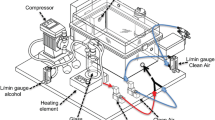Abstract
Six male Sprague-Dawley rats were trained on a DRL-20 operant schedule for food presentation. When stable performance was established, they were exposed to an escalating regimen of daily ethanol administration (1.125–3.75 g/kg. IP). This dosing regimen continued until the maximally tolerable dose for each subject was reached. Tolerance loss then was monitored for approximately 6 months by periodic ethanol challenge doses (1.5 g/kg). Dose-effect curves (DECs) were obtained prior to (DEC-1), immediately after (DEC-2), and 6 months following termination of (DEC-3) the ethanol exposure. Rate-increasing effects (DEC-1) were noted at low doses (0.75 and 1.125 g/kg), with a higher dose (2.25 g/kg) resulting in a decreased rate of responding. Tolerance, following chronic ethanol exposure, developed to both the rate-increasing and ratedecreasing effects of ethanol (DEC-2). While some tolerance was lost within the 6 months following the daily ethanol exposure (DEC-3), a significant degree of tolerance was still indicated by most of the response measures. This duration of tolerance was considerably longer than that generally reported, and is probably attributable to persistent learned compensatory behavior and/or intermittent ethanol challenge tests.
Similar content being viewed by others
References
Bass MB, Lester D (1980) Tolerance to ethanol-induced impairment of water escape in rats bred for ethanol sensitivity. Psychopharmacology 71:153–158
Bird DC, Holloway FA, Carney JC (1985) Schedule-controlled behavior as an index of the development and loss of ethanol tolerance in the rat. Psychopharmacology 87:414–420
Cappell H, LeBlanc AE (1979) Tolerance to, and physical dependence on, ethanol: Why do we study them? Drug Alcohol Depend 4:15–31
Chen CS (1972) A further note on studies of acquired behavioral tolerance to ethanol. Psychopharmacologia 27:265–274
Cicero TJ (1980) Alcohol self-administration, tolerance and withdrawal in humans and animals: Theoretical and methodological issues. In: Rigter H, Crabbe JC (eds) Alcohol tolerance and dependence. Elsevier/North Holland Biomedical Press, Amsterdam, pp 1–51
Dews PB (1955) Studies on behavior. I. Differential sensitivity to pentobarbital of pecking performance in pigeons depending on the schedule of reward. J Pharmacol Exp Ther 113:393–401
Holloway FA, Vardiman DR (1971) Dose-response effects of ethanol on appetitive behavior. Psychon Sci 24:218–220
Holloway FA, Bird DC, Holloway JA, Michaelis RC (1988) Behavioral factors in development of tolerance to ethanol's effects. Pharmacol Biochem Behav 29:105–113
Kalant H, LeBlanc AE, Gibbins RJ (1971) Tolerance to, and dependence on, some non-opiate psychotropic drugs. Pharmacol Rev 23:135–191
Kalant H, LeBlanc AE, Gibbins RJ, Wilson A (1978) Accelerated development of tolerance during repeated cycles of ethanol exposure. Psychopharmacology 60:59–65
Laties VG, Weiss B (1962) Effects of alcohol on timing behavior. J Comp Physiol Psychol 55:85–91
Leander JD, McMillan DE, Ellis FW (1976) Ethanol and isopropanol effects on schedule-controlled responding. Psychopharmacology 47:157–164
LeBlanc AE, Cappell H (1977) Tolerance as adaptation: Interactions with behavior and parallels to other adaptive processes. In: Blum K (ed) Alcohol and opiates: neurochemical and behavioral mechanisms. Academic Press, New York, pp 65–77
LeBlanc AE, Kalant H, Gibbins RJ, Berman ND (1969) Acquisition and loss of tolerance to ethanol by the rat. J Pharmacol Exp Ther 168:244–250
LeBlanc AE, Kalant H, Gibbins RJ (1975) Acute tolerance to ethanol in the rat. Psychopharmacologia 41:43–46
LeBlanc AE, Kalant H, Gibbins RJ (1976) Acquisition and loss of behaviorally augmented tolerance to ethanol in the rat. Psychopharmacology 48:153–158
Pohorecky LA (1977) Biphasic action of ethanol. Biobehav Rev 1:231–240
Schuster CR (1978) Theoretical basis of behavioral tolerance: implications of the phenomenon for problems of drug abuse. In: Krasnegor N (ed) Behavioral tolerance: research and treatment implications (NIDA Res Monogr 18, US Department of Health and Human Services). US Government Printing Office, Washington DC, pp 4–17
Schuster CR, Dockens WS, Woods JH (1966) Behavioral variables affecting the development of amphetamine tolerance. Psychopharmacologia 9:170–182
Sidman M (1955) Technique for assessing the effects of drugs on timing behavior. Science 122:925
Souza Moreira LF de, Capriglione MJ, Masur J (1981) Development and reacquisition of tolerance to ethanol administered pre- and post-trial to rats. Psychopharmacology 73:165–167
Author information
Authors and Affiliations
Rights and permissions
About this article
Cite this article
Bird, D.C., Holloway, F.A. Development and loss of tolerance to the effects of ethanol on DRL performance of rats. Psychopharmacology 97, 45–50 (1989). https://doi.org/10.1007/BF00443411
Received:
Accepted:
Issue Date:
DOI: https://doi.org/10.1007/BF00443411




